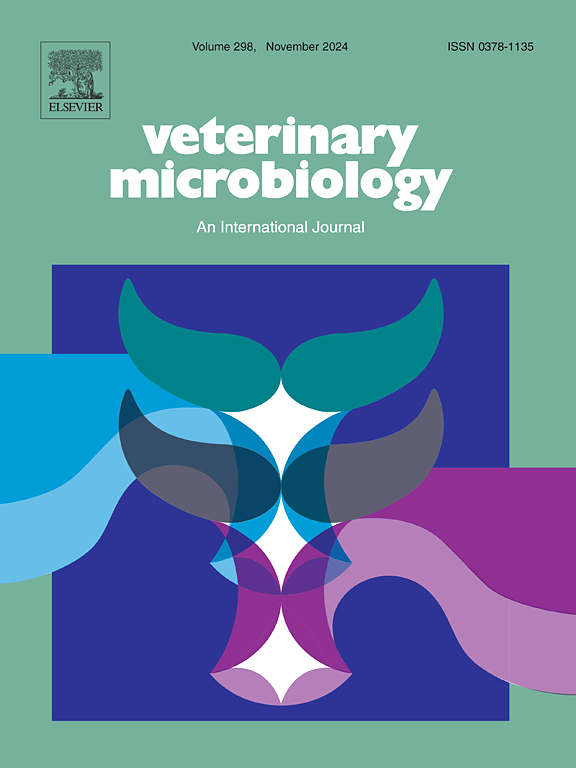STAT6 通过抑制 STUB1 和 NIX 介导的 MAVS 降解,促进对 BEFV 和 VSV 的先天免疫。
IF 2.4
2区 农林科学
Q3 MICROBIOLOGY
引用次数: 0
摘要
信号转导子和转录激活子 6(STAT6)是 STAT 蛋白家族的重要成员,在先天性免疫中发挥着重要作用,但其通过降解 MAVS 来调节先天性免疫的功能尚未被描述。在这项研究中,我们发现 STAT6 可抑制牛短暂热病毒(BEFV)和水泡性口炎病毒(VSV)的复制。进一步的研究发现,STAT6 能在 BEFV 和 VSV 感染的情况下促进 I 型 IFN(IFN-I)信号通路。此外,敲除 STAT6 会导致 MAVS 通过泛素蛋白酶体和自噬溶酶体途径降解。从机理上讲,STAT6会导致E3泛素连接酶STIP1同源和含Ubox蛋白1(STUB1)的下调,抑制STUB1与MAVS之间的相互作用,减少STUB1介导的与K48连接的MAVS泛素化,从而抑制MAVS通过泛素-蛋白酶体途径降解。此外,STAT6 还能抑制 MAVS 通过自噬受体 Bcl2 交互蛋白 3 like(NIX)介导的自噬途径降解。综上所述,我们的研究揭示了一种新的机制,即 STAT6 在 BEFV 和 VSV 感染过程中作为 I 型 IFN 信号通路的正向调节因子,主要通过抑制 MAVS 降解并最终抑制 BEFV 和 VSV 感染。这些发现为 STAT6 对 MAVS 降解的调控提供了有价值的见解,可作为设计新型抗病毒药物的基础。本文章由计算机程序翻译,如有差异,请以英文原文为准。
STAT6 promotes innate immunity against BEFV and VSV by inhibiting STUB1 and NIX-mediated MAVS degradation
Signal transducers and activators of transcription 6 (STAT6), an essential member of the STAT protein family, plays vital roles in innate immunity, however, its function in regulating innate immunity through the degradation of MAVS has not been described. In this study, we found that STAT6 suppresses the replication of both bovine ephemeral fever virus (BEFV) and vesicular stomatitis virus (VSV). Further investigations revealed that STAT6 promotes the type I IFN (IFN-I) signaling pathway in the context of BEFV and VSV infection. Moreover, the knockout of STAT6 leads to the degradation of MAVS through both the ubiquitin-proteasome and autophagolysosomal pathways. Mechanistically, STAT6 results in the downregulation of E3 ubiquitin ligase STIP1 homology and Ubox-containing protein 1 (STUB1), inhibits the interaction between STUB1 and MAVS, and reduces STUB1- mediated K48-linked MAVS ubiquitination, thereby inhibiting the MAVS degradation through the ubiquitin-proteasome pathway. Furthermore, STAT6 also suppresses MAVS degradation through the autophagy receptor Bcl2 interacting protein 3 like (NIX)-mediated autophagy pathway. Taken together, our study unveils a novel mechanism by which STAT6 acts as a positive regulator of the type I IFN signaling pathway during BEFV and VSV infection, predominantly by inhibiting MAVS degradation and ultimately suppressing BEFV and VSV infection. These findings provide valuable insights into the regulation of MAVS degradation by STAT6, which may serve as a basis for the design of novel antiviral agents.
求助全文
通过发布文献求助,成功后即可免费获取论文全文。
去求助
来源期刊

Veterinary microbiology
农林科学-兽医学
CiteScore
5.90
自引率
6.10%
发文量
221
审稿时长
52 days
期刊介绍:
Veterinary Microbiology is concerned with microbial (bacterial, fungal, viral) diseases of domesticated vertebrate animals (livestock, companion animals, fur-bearing animals, game, poultry, fish) that supply food, other useful products or companionship. In addition, Microbial diseases of wild animals living in captivity, or as members of the feral fauna will also be considered if the infections are of interest because of their interrelation with humans (zoonoses) and/or domestic animals. Studies of antimicrobial resistance are also included, provided that the results represent a substantial advance in knowledge. Authors are strongly encouraged to read - prior to submission - the Editorials (''Scope or cope'' and ''Scope or cope II'') published previously in the journal. The Editors reserve the right to suggest submission to another journal for those papers which they feel would be more appropriate for consideration by that journal.
Original research papers of high quality and novelty on aspects of control, host response, molecular biology, pathogenesis, prevention, and treatment of microbial diseases of animals are published. Papers dealing primarily with immunology, epidemiology, molecular biology and antiviral or microbial agents will only be considered if they demonstrate a clear impact on a disease. Papers focusing solely on diagnostic techniques (such as another PCR protocol or ELISA) will not be published - focus should be on a microorganism and not on a particular technique. Papers only reporting microbial sequences, transcriptomics data, or proteomics data will not be considered unless the results represent a substantial advance in knowledge.
Drug trial papers will be considered if they have general application or significance. Papers on the identification of microorganisms will also be considered, but detailed taxonomic studies do not fall within the scope of the journal. Case reports will not be published, unless they have general application or contain novel aspects. Papers of geographically limited interest, which repeat what had been established elsewhere will not be considered. The readership of the journal is global.
 求助内容:
求助内容: 应助结果提醒方式:
应助结果提醒方式:


